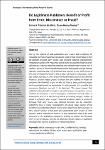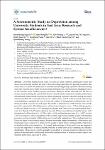Search
Author
- Jaime A Teixeira da Silva (1)
- Manh-Cuong Nguyen (1)
- Manh-Toan Ho (1)
- Manh-Tung Ho (1)
- next >
Subject
- article processing charge (1)
- China (1)
- confidentiality (1)
- depressive disorder (1)
- next >
Date issued
Search Results
One of the aspects of post-publication peer review that is difficult for reputable journals or publishers to accept is that it may reveal flaws in their oft-claimed resilient peer review and efficient editorial management. Prospective authors are frequently sold a brand-associated image of a fail-safe process, rigorous editorial handling, and stringent peer review. Yet, in reality, a sector of the published literature that has passed through claimed rigorous screening may still be flawed and contain errors, while some of the peer-reviewed literature is the product of fraud or misconduct. Even top-ranked journals, in terms of journal-based metrics such as the Clarivate Analytics’ journal impact factor, or those that are indexed or hosted on platforms like PubMed, Scopus or Web of Sci... |
Given that mental health issues are acute in Asian countries, particularly Japan and Korea, and university students are more vulnerable to depression than the general population, this study aims to examine the landscapes of scientific research regarding depressive disorders among university students and evaluate the effectiveness of international collaboration and funding provision on the scientific impact in Korea, Japan, and China. Based on articles retrieved from the Web of Science database during the period 1992–2018, we found that the number of scientific publications, international collaborations, and allocated funds regarding depressive disorder among university students in China (97 articles, 43 international collaborations, and 52 funds provided, respectively) overwhelmingl... |


